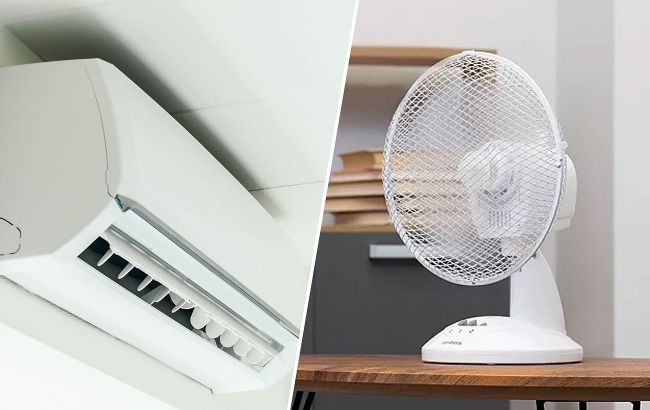Air conditioner vs. fan: Which cools better
 What is better for cooling: a fan or an air conditioner (collage: RBC-Ukraine)
What is better for cooling: a fan or an air conditioner (collage: RBC-Ukraine)
With the arrival of summer heat, many people are asking: what is better to use for cooling – an air conditioner or a fan? Both devices have their advantages and disadvantages, and the choice depends on various factors, including the region of residence, energy efficiency, and environmental considerations.
RBC-Ukraine (Styler project) explains the differences between an air conditioner and a fan, and which one is better suited for use.
Why choose an air conditioner
Efficiency and effectiveness
Air conditioners are often praised for their ability to quickly and efficiently cool a room. Unlike fans, which simply circulate air, air conditioners lower the air temperature by removing heat and humidity from the environment. This cooling effect is especially useful in regions with high humidity, where fans might just move around warm, moist air.
A study by the US Department of Energy confirms that air conditioners are more effective at reducing room temperature compared to fans, especially during extreme heat. This ability to control both temperature and humidity makes air conditioners the preferred choice for many homes.
Comfort and health benefits
Air conditioners not only cool the air but also improve indoor air quality. Modern air conditioners are equipped with filters that capture dust, pollen, and other allergens, alleviating conditions for people with respiratory issues.
According to the American Lung Association, air conditioning can reduce the risk of heat-related illnesses, particularly among vulnerable populations such as the elderly and those with chronic conditions.
Technological advancements
Recent advancements in air conditioning technology have also made them more energy-efficient and environmentally friendly. The introduction of inverter technology allows air conditioners to adjust cooling power based on room temperature, leading to significant energy savings.
Why choose a fan
Cost and energy consumption
Fans are significantly cheaper to purchase and operate compared to air conditioners. The initial cost of a fan is only a fraction of the cost of an air conditioner, and fans consume much less electricity.
Mobility and versatility
Fans are portable and can be easily moved from room to room, making them more flexible to use. They come in various types, including ceiling fans, table fans, and oscillating fans, each catering to different needs and preferences.
This versatility makes fans a practical solution for those who need temporary relief from the heat without the need for installing an air conditioning system.
Simplicity and maintenance
Fans are simple devices with minimal maintenance requirements. Unlike air conditioners, which require regular servicing and refrigerant checks, fans typically only need periodic dusting. This simplicity appeals to many homeowners who prefer low-maintenance appliances.
Combining for optimal comfort
For those seeking a balance between cost and comfort, combining air conditioners and fans can be an effective strategy. Using a fan alongside an air conditioner allows the latter to operate at a higher temperature while maintaining a comfortable environment, thereby reducing energy consumption.
Application in real conditions
Regional advantages
The benefits of cooling methods can vary significantly depending on the region. In cooler climates where extreme heat is rare, fans may suffice for most of the summer.
Conversely, in areas with hot and humid summers, air conditioners are practically essential.
Environmental considerations
The environmental impact is another crucial factor in the debate over air conditioners and fans. Air conditioners, especially older models, are notorious for their high energy consumption and use of refrigerants that can contribute to global warming. On the other hand, fans are generally more environmentally friendly due to their lower energy consumption.
However, advancements in air conditioning technology, such as the development of eco-friendly refrigerants and energy-efficient devices, are helping to mitigate these environmental concerns.

